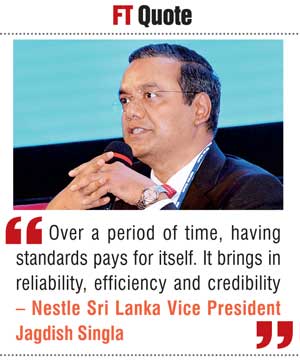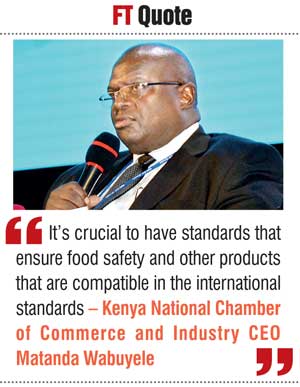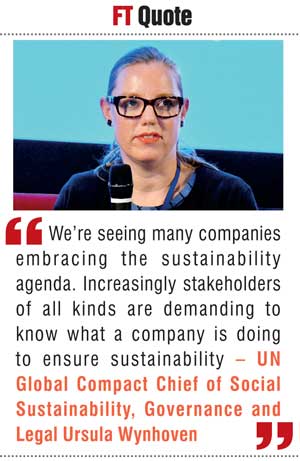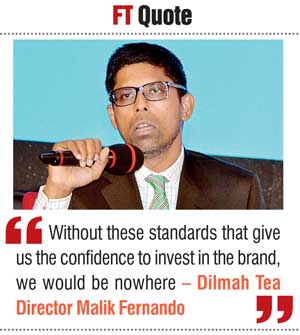Tuesday Feb 17, 2026
Tuesday Feb 17, 2026
Friday, 14 October 2016 00:01 - - {{hitsCtrl.values.hits}}
Moderator CCTV Correspondent Xin Liu, Dilmah Tea Director Malik Fernando, International Organization for Standardization Regional Manager Colin Low, UN Global Compact Chief of Governance and Social Sustainability Ursula Wynhoven, Nestle Sri Lanka Vice President Jagdish Singla, Kenya National Chamber of Commerce and Industry CEO Matanda Wabuyele, BOI Chairman Upul Jayasuriya and International Trade Centre (ITC) Chief Economist Marion Jansen at the Panel
 Adhering to industry specific standards are a crucial if somewhat costly endeavour for any business worth its salt, a panel of business leaders and think-tank representatives concluded yesterday.
Adhering to industry specific standards are a crucial if somewhat costly endeavour for any business worth its salt, a panel of business leaders and think-tank representatives concluded yesterday.
At a panel discussion titled ‘Standards, a gateway to global markets’ held on the second day of the World Export Development Forum 2016 held in Colombo, the panel moderated by CCTV correspondent Xin Liu discussed the finer points of adopting widely- accepted international standards.
accepted international standards.
Opening the discussion, Director Dilmah Tea Malik Fernando said that adhering to standards is an “absolutely basic entry requirement” for corporations, countries, retailers, alike.
When Dilmah was founded 30 years ago, he said, exporting unprocessed or semi-processed products was unheard of. When the company decided to fully embrace value-added tea as its main product, it had to be second to none.
“So we couldn’t pass the buck to importers and brand owners as many exporters might do with regard to food safety and other processes. We had to do everything here. We didn’t have any standards to adhere to back then, in the early ’80s. It was critically important for retailers, the confidence of importers and most importantly for a fledgling brand,” said Fernando.
“Without these standards that give us the confidence to invest in the brand, we would be nowhere,” he added.
According to Fernando, Dilmah was the first company to adopt the Hazard Analysis Critical Control Point (HACCP) standards, having secured the accreditation from auditors from the Netherlands.
“Ceylon Tea, which is our raw material, has a long history of regulation and compliance. There’s a regulatory body, we have stringent rules on child labour, worker rights, etc. It’s heavily unionised. Some might say a bit too unionised. The chief product was protected through 140 years of standards,” said Fernando.
However, the company had to focus on a lot of food safety and standardised process certification within the processing, he said.
Challenges in adopting standards
Responding to a question on the challenges in adopting standards, Fernando said that one of the biggest hurdles is the availability  of too many sets of standards to choose from. Less, it seems, is more.
of too many sets of standards to choose from. Less, it seems, is more.
“The challenge was to pick which standards to adhere to. There was a multitude of standards on quality and on sustainability – not only country specific but company specific. One of the companies we supply to globally is McDonald’s. To meet their standard, a huge range of human rights, business integrity, environmental management standards [had to be adopted],” said Fernando.
Another challenge, he said, is the unavailability of harmonised standards for a specific industry. For example, while the tea trade operates on stringent standards, internationally, these standards are interpreted differently from country to country. According to Fernando, sometimes the different sets of standards can even be contradictory.
“We also had issues in terms of production efficiency, because some standards were contradictory, so you couldn’t possibly ship the same product, although the tea was virtually the same. You had to have customised runs because of the complexities of the standards,” he said.
Delays in updating companies on the standards required, as well as delays in communication and integration of said standards are also problems. Some of these challenges, he said, can be met by over certification for the protection required.
Of course, adhering to standards is going to cost any company a fair bit of money. But, according to Fernando, it’s well worth the investment.
“Yes, it’s a tremendous cost, but ultimately your intellectual property, your brand equity relies entirely on these standards,” he said.
Nestle Sri Lanka Vice President Jagdish Singla concurred.
“Over a period of time, having standards pays for itself. It brings in reliability, efficiency and credibility,” said Singla.
 “Not just in food, in any industry as well as the service sector, standards are important. When a customer experiences your product, it’s important that it meets their expectations. Every time a product is bought, deliver the same thing again and again. That is important. It’s not impossible unless you have clear standards across the value chain,” he added.
“Not just in food, in any industry as well as the service sector, standards are important. When a customer experiences your product, it’s important that it meets their expectations. Every time a product is bought, deliver the same thing again and again. That is important. It’s not impossible unless you have clear standards across the value chain,” he added.
Role of standards relevant everywhere
The role of standards is relevant everywhere. Imagine an organisation selling products across the world, and having trying to report its sales in the US without adhering to world accounting standards, said Singla.
“It should be seen not as a burden but as an opportunity,” he said.
Kenya National Chamber of Commerce and Industry CEO Matanda Wabuyele, pointed out the roles played by private public partnerships in standards.
“Kenya is one of the leading countries in exports of our culture, as well as tea. As part of positioning ourselves on the global value chain, one way was to look at our standards in the area of fresh foods. As a country, both the public and private sector have to come together to see how to meet the food safety standards, to sustain those standards and ensure consumer protection in terms of food safety,” said Wabuyele.
Capacity building is of the utmost importance, he added, pointing out the veterinary and animal health standards adhered to by his country.
“It’s crucial to have standards that ensure food safety and other products that are compatible in the international standards,” he said.
Standards and sustainable development
UN Global Compact Chief of Social Sustainability, Governance and Legal Ursula Wynhoven, touching on the importance of standards with regard to sustainable development, said that in the wake of all member states of the United Nations adopting the Sustainable Development Goals, there has been an unprecedented level of involvement by the private sector in adhering to the same.
“We’re seeing many companies embracing the sustainability agenda. Increasingly stakeholders of all kinds are demanding to know what a company is doing to ensure sustainability,” she said.
 Companies are not islands independent of social responsibility, said Wynhoven, adding that it’s in a company’s best interest to be an early adopter rather than a late follower.
Companies are not islands independent of social responsibility, said Wynhoven, adding that it’s in a company’s best interest to be an early adopter rather than a late follower.
“Sustainability is no longer a fad,” she stressed.
Compliance can often be a nightmare
How many regulations are too many, however?
According to Fernando, whose company sells tea in over 100 markets, compliance to standards can often be a nightmare that requires customisation and extra labelling. Overcompensation is one solution to this problem, he said.
Singla, speaking of the importance of not having standards in isolation, said that having standards across a single organisation is not enough. A business, he said, needs to have credible business partners, suppliers, etc.
“Their failure is your failure. Make sure they succeed. They need to have standards in compliance to your business requirements,” said Singla.
When it comes to compliance, he said, monitoring is important, but we have to move beyond that to a compliance management culture.
“It has to be everyone’s responsibility to ensure there is a compliance of standards. It is the only way to guarantee there is zero failure,” he said.
Pix by Upul Abayasekara